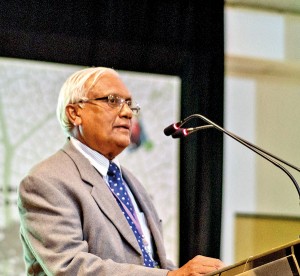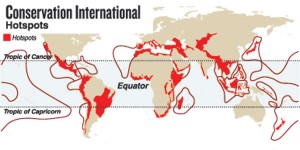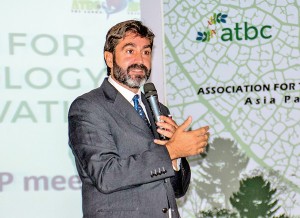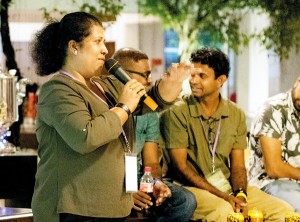News
Lanka’s biodiversity a global heritage: Asia-Pacific scientists urge Govt. to intensify conservation efforts
Tropical biologists and conservation scientists representing 29 countries have appealed to the Sri Lankan government to redouble its efforts to protect the country’s unique biodiversity which they describe as a global heritage.

Prof. Nimal Gunatilleke
The tropical biologists and scientists were in Sri Lanka to attend the four-day global forum of the Association for Tropical Biology and Conservation Asia-Pacific (ATBC-AP).
Sri Lanka is home to more than 8,600 plant and animal species, of which more than 1,600 are endemic to the island.
In their appeal, the experts call for the setting up of ecological corridors to link fragmented biodiversity-rich habitats, especially in Sri Lanka’s wet zone, the incorporation of the valuation of ecosystem services into Environmental Impact Assessment (EIA) and increased efforts to conserve the biodiversity in the Mannar region.
About 350 participants from 29 countries attended Conference held at the MAS Athena complex in Thulhiriya from September 10 to 13. Their appeal and recommendations were included in a end-of-summit communiqué which they called the Thulhiriya Declaration.
Established in 1963, the ATBC is one of the largest international scientific and professional organisations engaged in promoting research, education, capacity building and communication regarding the world’s tropical ecosystems. ATBC’s Asia Pacific Chapter was established in 2007 and the Thulhiriya conference was their 12th annual gathering.
The conference was inaugurated by President Maithripala Sirisena by planting an Atamba (Wild Mango) tree at the MAS Athena premises.
Addressing the gathering, the President said the tropical countries like Sri Lanka faced an imminent threat to biodiversity in the face of climate change, accelerated development efforts and population growth. He said it was important that scientists find ways address the problems by striking a balance.
The event’s co-chair, Dr. Sampath Seneviratne, justifying the decision to invite a political leader to inaugurate a conference on science, said: “We can discuss science within our own academic circles, but we need to take this knowledge beyond these walls toward policy level to make a real impact on conservation. That is one of the main reasons of getting the president of the country to inaugurate the ATBC-AP conference.”
To sustain the momentum of the conference, the organisers established the Sri Lanka Ecological Association (SLEA), a professional body, with the aim of providing advisory services to the Sri Lankan Government, the private sector and other stakeholders.
Adding some diplomatic lifelines to the science forum were French ambassador Eric Lavertu and Indian High Commission diplomat Sanjana Arya.

ATBC global President Dr. Ahimsa Campos-Arceiz
During the three-day conference, about 30 symposia were conducted through five parallel sessions where as many as 200 papers were presented.
Seven eminent local and international scientists delivered keynote addresses.
Before the conference was convened, several workshops covering technical subjects were conducted followed by research-oriented field tours.
ATBC-AP chairperson Dr. Enoka Kudawidanage said the conference offered opportunities for scientists and practitioners to gain new insights and knowledge while acquiring skills to contribute towards capacity building within the Asia-Pacific region.
“As there were foreign scientists with number of them eminent experts in their fields, the event had been particularly an opportunity for participants to get networking, collaboration and learning” said Dr. Kudawidanage, who was also elected as the Secretary of the ATBC-AP chapter for the coming year.
Professor Nimal Gunatilleke, the co-chair of the Scientific Committee of the conference, said Sri Lanka and India’s Western Ghatts were collectively considered as one of the global biodiversity hotspots, and therefore, the collaborative opportunities the event created were enormous.
India was represented by a contingent of about 60 scientists.

ATBC-AP chairperson Dr. Enoka Kudawidanage
The tropical region is the area near the equator and between the Tropic of Cancer in the northern hemisphere and the Tropic of Capricorn in the southern hemisphere. The tropics comprise 40 percent of the Earth’s surface area; but have diverse habitats ranging from rainforests to deserts and from savannahs to mangroves. With most biodiversity hotspots spread in the area, the tropical zone is home to 80 percent of the earth’s species. But with India and China making up a part of the tropical regions, it is expected that the two countries would harbour half of the human population by 2030 causing huge pressure on natural ecosystems.
The conference became a forum for local researchers to meet experts from the Asia and Pacific region. Dr. Kanishka Ukuwela, who conducted a research on skinks in Sri Lanka, met an Indian scientist who is researching on skinks of India. “In this age of communication, we could collaborate through different means of technology – but it is not like sharing the research interests talking on a live chat face to face,” said Dr. Ukuwela after having a friendly skinky chat with his Indian counterparts.
ATBC global President Dr. Ahimsa Campos-Arceiz of the University of Nottingham told the Sunday Times that ATBC-AP were happy to be here in Sri Lanka, pointing out that there was a good diversity of delegates from different institutes and disciplines.
“Sri Lanka has a big role in tropical ecology and produced some of the eminent researchers such as Prof. Savithri Gunathilleke,” he said.
In 2016, Prof. Savithri Gunathilleke was honored as an ATBC Honorary Fellow – an award given to researchers who have provided life-long distinguished service to science and tropical biology.

